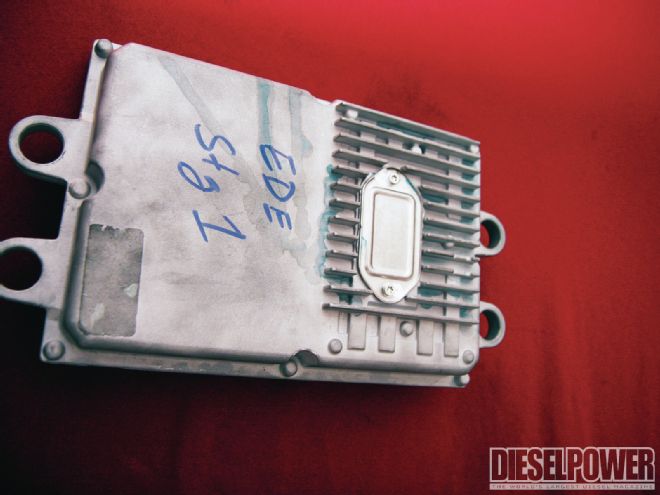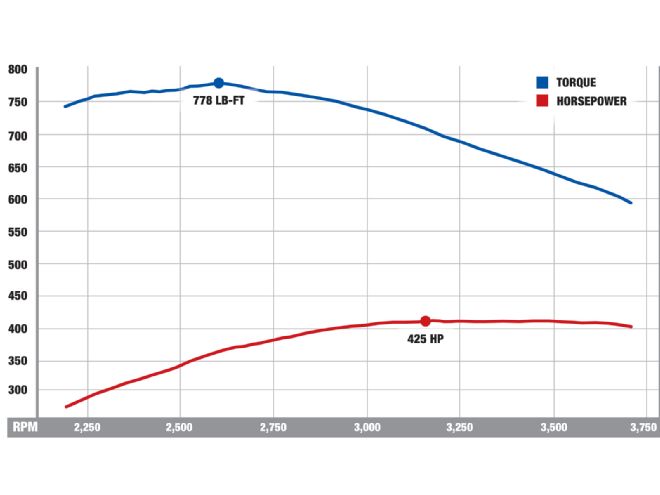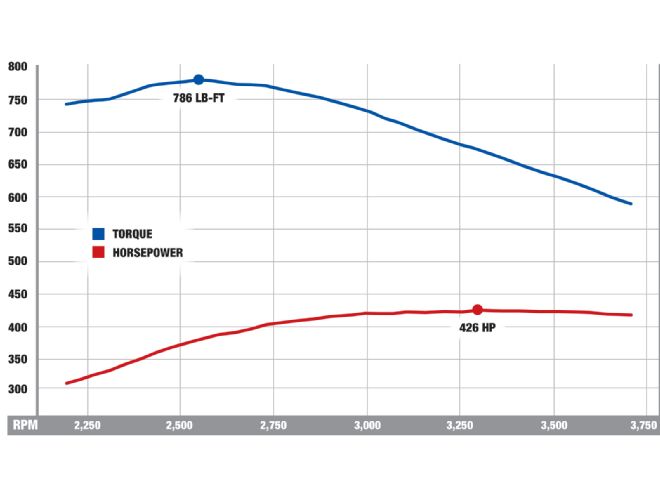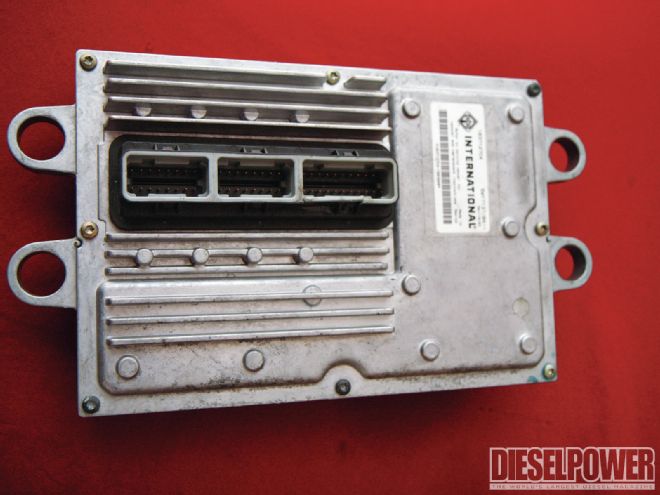Fuel injection control module (FICM) upgrades are said to add an extra punch to ’03 to ’07 Super Dutys already uploaded with powertrain control module (PCM) tuning. After receiving the desired fuel volume and injection control pressure (ICP) information from the PCM, the FICM calculates injector fuel delivery time and sends a 48-volt pulse to the injector to fire it. Reprogramming the FICM, as well as amplifying the voltage sent to the injectors (58-volt units), can add performance, mileage, and throttle response, and improve cold starts.

| project Outcast Part 4 2003 Ford F 250 On Dyno
The name of the game with aftermarket FICM modifications is to squeeze every last ounce of power out of the 6.0L Power Stroke’s stock injectors. Depending on the truck, an extra 5 to 30 rwhp can be gained. Armed with Innovative Diesel’s new FICM programmer and a 58-volt FICM and Stage 1 FICM from Elite Diesel Engineering, we headed to Randall’s Performance to hit the chassis dyno with our ’03 F-250. We also spent some time driving our early 6.0L with each product installed. Read on to see our power gains, as well as the mileage increases we recorded.
With this testing complete, we feel we’ve exhausted the potential of the stock injectors—so stick around. In the coming months, we’ll be installing bigger injectors and an upgraded turbo.
Price List
Product:
Vendor:
Price:
FICM Programmer
Innovative Diesel
$299
58-volt FICM
Elite Diesel Engineering
$555
Stage 1 FICM
Elite Diesel Engineering
$635
Program Any 6.0L FICM
Innovative Diesel’s FICM Programmer is said to be capable of unlocking as much as 25 additional horsepower for stock-injector 6.0L trucks already running custom PCM tuning. This piqued our interest, because we were running Elite Diesel’s Insanity tune (its hottest custom PCM file). One of the best aspects of Innovative’s FICM programmer is that it will work in conjunction with any model year truck, and with any PCM and TCM tuning device on the market (SCT, H&S, Bully Dog, Banks, Edge, Superchips). To tune the FICM, we simply pulled the gray FICM relay under the hood and plugged the handheld programmer into the OBD-II port. The original FICM programming gets stored on the module.

| project Outcast Part 4 innovative Diesel Tuner
Innovative offers either mild, moderate, or race tuning on its FICM programmer (customers simply specify which one they want). The programmer we received was uploaded with the moderate version. According to the folks at Innovative, it’s a fine balance of power vs. mileage and driveability, and they believe the moderate version yields the best results when used alongside custom PCM tuning.
FICM Programmer Results
After making 416 hp and 762 lb-ft of torque with just the Insanity tune from Elite Diesel (Aug. ’12), we picked up 5 hp and 17 lb-ft of torque with Innovative Diesel’s FICM programmer. While these numbers may seem minimal, the increase in horsepower and torque is present across the entire rpm range (2,200 rpm to 3,700 rpm). On the mileage front, we picked up 3 mpg with the FICM programmer. Keep in mind: Mileage gains will vary from truck to truck, and Innovative states that 1-to-2-mpg gains are most common.
Insanity PCM Tune: 416 hp at 3,500 rpm, 762 lb-ft of torque at 2,500 rpm
Insanity PCM Tune and Innovative FICM Flash: 421 hp at 3,500 rpm, 779 lb-ft of torque at 2,500 rpm
* Dyno pulls were made in Fourth Gear (converter locked)
* Dyno runs began at 55 mph and ended at 95 mph
* 30 percent load applied
* DynoJet correction factor

| project Outcast Part 4 ficm Programmer Results
58-volt FICM Results
After swapping out the factory FICM for the 58-volt unit from Elite, we saw a 9hp increase along with 16 additional lb-ft of torque. However, peak horsepower was achieved earlier in the powerband (3,150 rpm vs. 3,500 rpm) and was sustained until 3,600 rpm. An 8-to-9hp gain was also achieved across the entire rpm range.
Insanity PCM Tune: 416 hp at 3,500 rpm, 762 lb-ft of torque at 2,500 rpm
Insanity PCM Tune and Elite 58-volt FICM: 425 hp at 3,150 rpm, 778 lb-ft of torque at 2,600 rpm
* Dyno pulls were made in Fourth Gear (converter locked)
* Dyno runs began at 55 mph and ended at 95 mph
* 30 percent load applied * DynoJet correction factor

| project Outcast Part 4 58 Volt Ficm Results
Stage 1 FICM Results
We saw our biggest gains with the 58-volt Stage 1 FICM. Peak horsepower came in at a lower engine speed than with just the PCM tune (3,300 rpm vs. 3,500 rpm) and the truck made 10 extra ponies. Peak torque remained at roughly 2,500 rpm but jumped up by 24 lb-ft of torque. As previously mentioned, this FICM really shined on the street, where throttle response was noticeably improved, making the overall driving experience more fun. When we were able to lay off the throttle, the truck averaged 14.6 mpg, too (vs. 11.56 mpg with the stock FICM).
Insanity PCM Tune: 416 hp at 3,500 rpm, 762 lb-ft of torque at 2,500 rpm
Insanity PCM Tune and Elite Stage 1 FICM: 426 hp at 3,300 rpm, 786 lb-ft of torque at 2,550 rpm
* Dyno pulls were made in Fourth Gear (converter locked)
* Dyno runs began at 55 mph and ended at 95 mph
* 30 percent load applied
* DynoJet correction factor

| project Outcast Part 4 stage 1 Ficm Results
Later-Calibration Trucks Could See Better hp Gains
Something to remember: We conducted our testing on an early ’03 truck. For the ’05 model year, Ford released new PCM and FICM calibrations, as well as updated most early 6.0L trucks that came into the dealership for service. These updates were intended to aid cold starts but ended up leading to lower mileage, slightly less power, and less throttle response. In short, the early engines had the best FICM programming from the factory—and our ’03 still had the original FICM programming when we began testing. So, better power gains could be (and are more than likely) possible on ’05 to ’07 model 6.0Ls, or any ’03 to ’04 6.0L that received the de-rated FICM re-flash from Ford.
 | project Outcast Part 4 ficm Programmer Results
58-volt FICM Results
| project Outcast Part 4 ficm Programmer Results
58-volt FICM Results

 | project Outcast Part 4 58 Volt Ficm Results
Stage 1 FICM Results
| project Outcast Part 4 58 Volt Ficm Results
Stage 1 FICM Results | project Outcast Part 4 stage 1 Ficm Results
Later-Calibration Trucks Could See Better hp Gains
| project Outcast Part 4 stage 1 Ficm Results
Later-Calibration Trucks Could See Better hp Gains